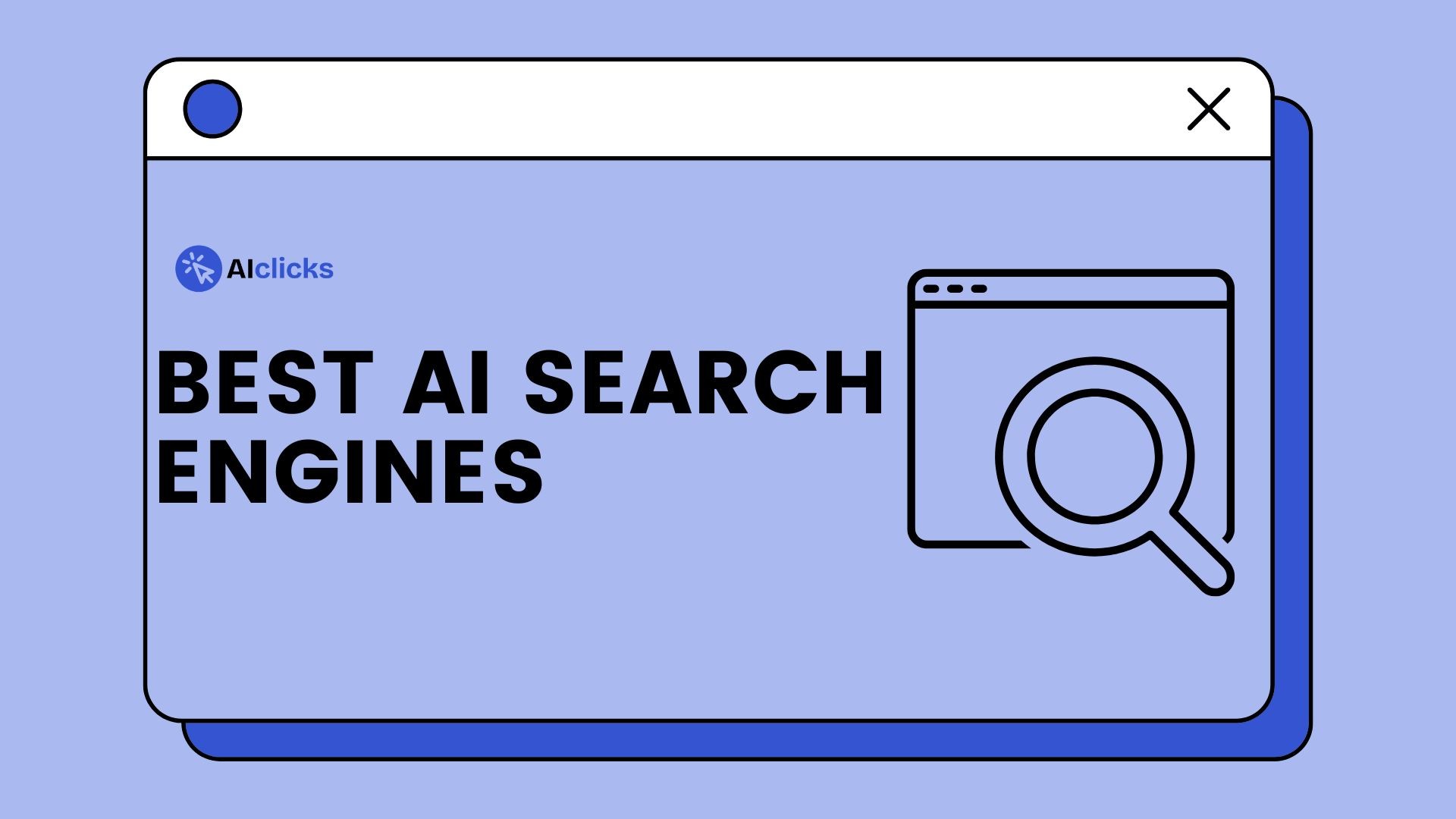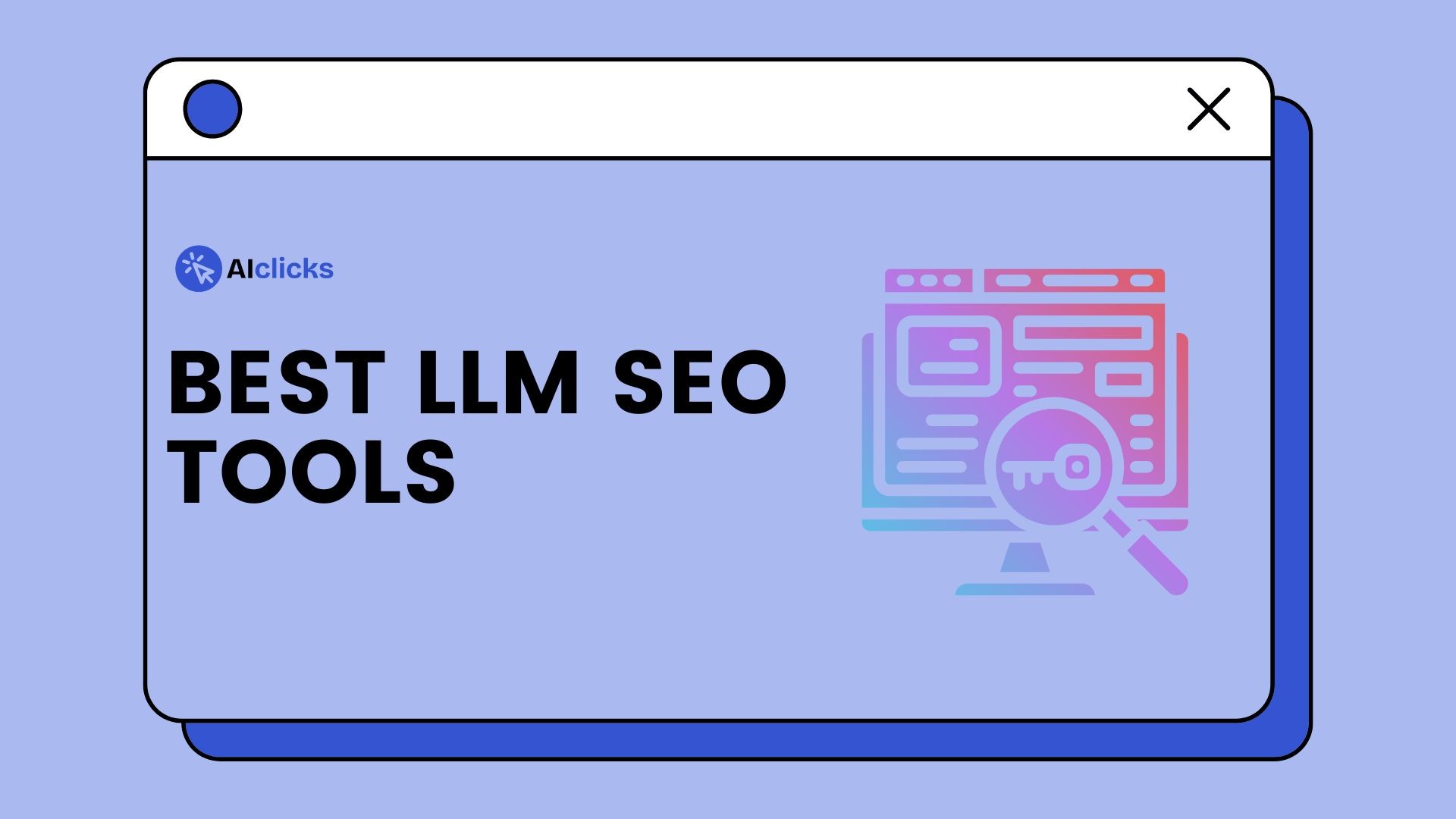Written by:
Matas Kibildis
Head of Growth @ aiclicks.io
Reviewed by:
Rokas Stankevicius
Founder @ aiclicks.io
AI search is everywhere now. Whether you’re asking ChatGPT for recommendations, searching with Bing Copilot, or using Google’s AI Overviews, the way brands get discovered is changing fast.
As the founder of aiclicks.io, I’ve spent the last few years watching this shift up close. We’ve tested, failed, learned – a dozen times over. Our early experiments showed one thing: you need a clear, repeatable system to earn top spots in AI-generated answers.
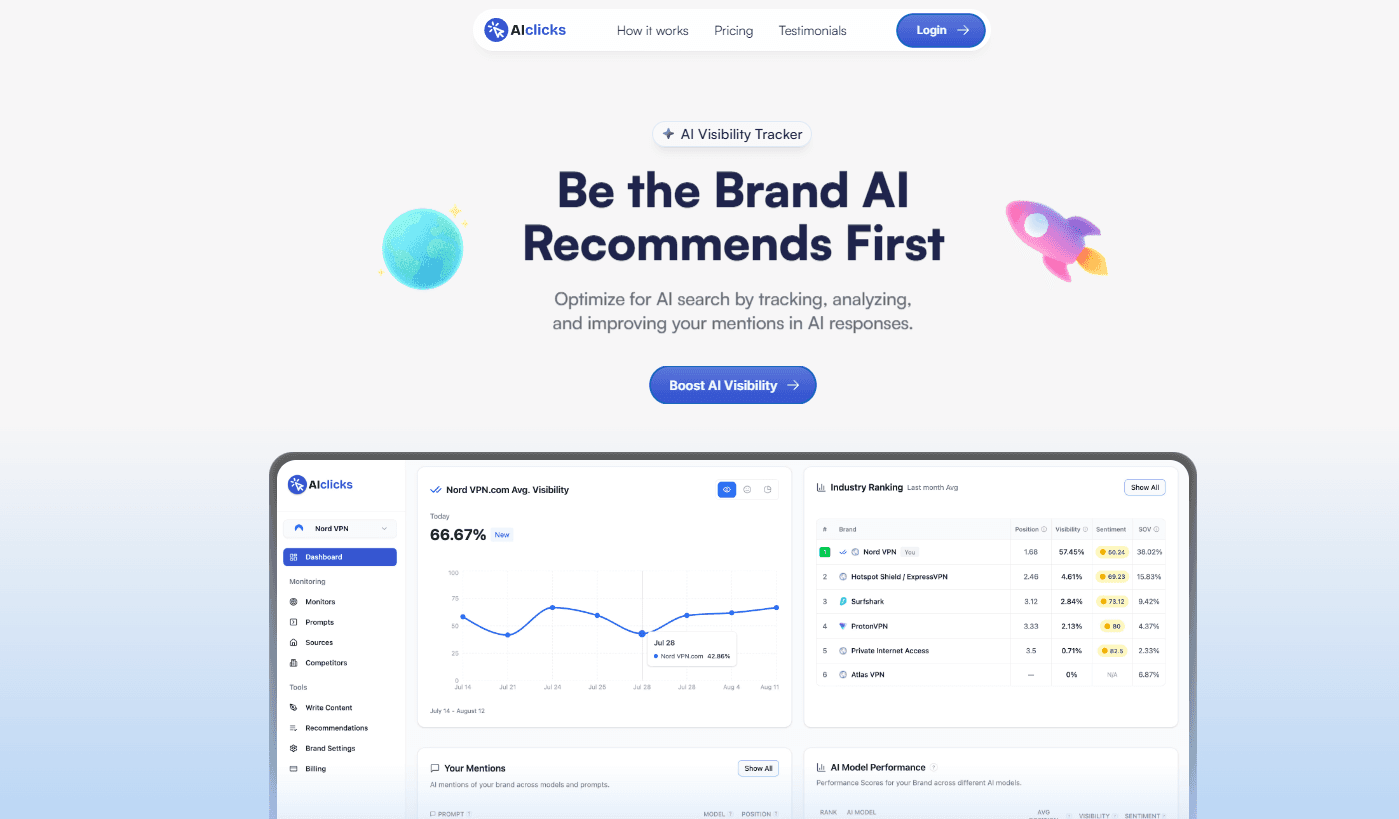
Below, I’ll walk you through a step-by-step playbook that any brand or marketer can use to win visibility in this new world.
Let’s keep it simple. Think of AI search as a very smart librarian. Instead of just grabbing websites with the exact title, it reads, summarizes, and explains – as if it’s answering your question in conversation. If your content is easy for these “librarians” to cite, your brand gets mentioned more often.
Optimizing Website for AI Search Engines TL;DR
AI search results has become the new front page of the internet, and winning visibility means making your content easy for AI agents like ChatGPT, Perplexity, and Google’s AI Overviews to read, understand, and cite.
Start by measuring everything – track AI-referrer traffic in GA4, monitor prompt-level visibility with dashboards like AIclicks.io, and map topic clusters directly to revenue to see what drives results.
Build prompt and keyword clusters around real conversational queries, then create answer-first, snippable, well-structured content with lists, tables, FAQs, and short definitions that AI can easily extract.
Keep your technical foundation solid by allowing AI crawlers, using server-side rendering, updating segmented sitemaps, and maintaining clear site architecture and schema markup for discoverability.
Long-term success comes from consistent authority and iteration – refresh content weekly, earn trusted citations and reviews, and use automation tools like AIclicks to track visibility, fill content gaps, and stay ahead in AI-driven search.
1. Instrumentation & Measurement of AI Search Engines
You can’t improve what you can’t measure. When we built aiclicks.io, the first problem we solved was tracking our share of AI-driven answers – something Google Analytics ignores by default.
Set up a GA4 AI referrer segment. This tracks when traffic comes from tools like ChatGPT, Perplexity, or Copilot. For detailed instructions, check our previous post on how to track AI search traffic in Google Analytics (GA4). I remember spending hours sorting through referrer logs by hand before our dashboard automated this.

Use an AI visibility dashboard (like ours at aiclicks.io). This gives you a bird’s-eye view: which prompts mention your brand, how many times you’re cited, and which sources AI agents trust most.
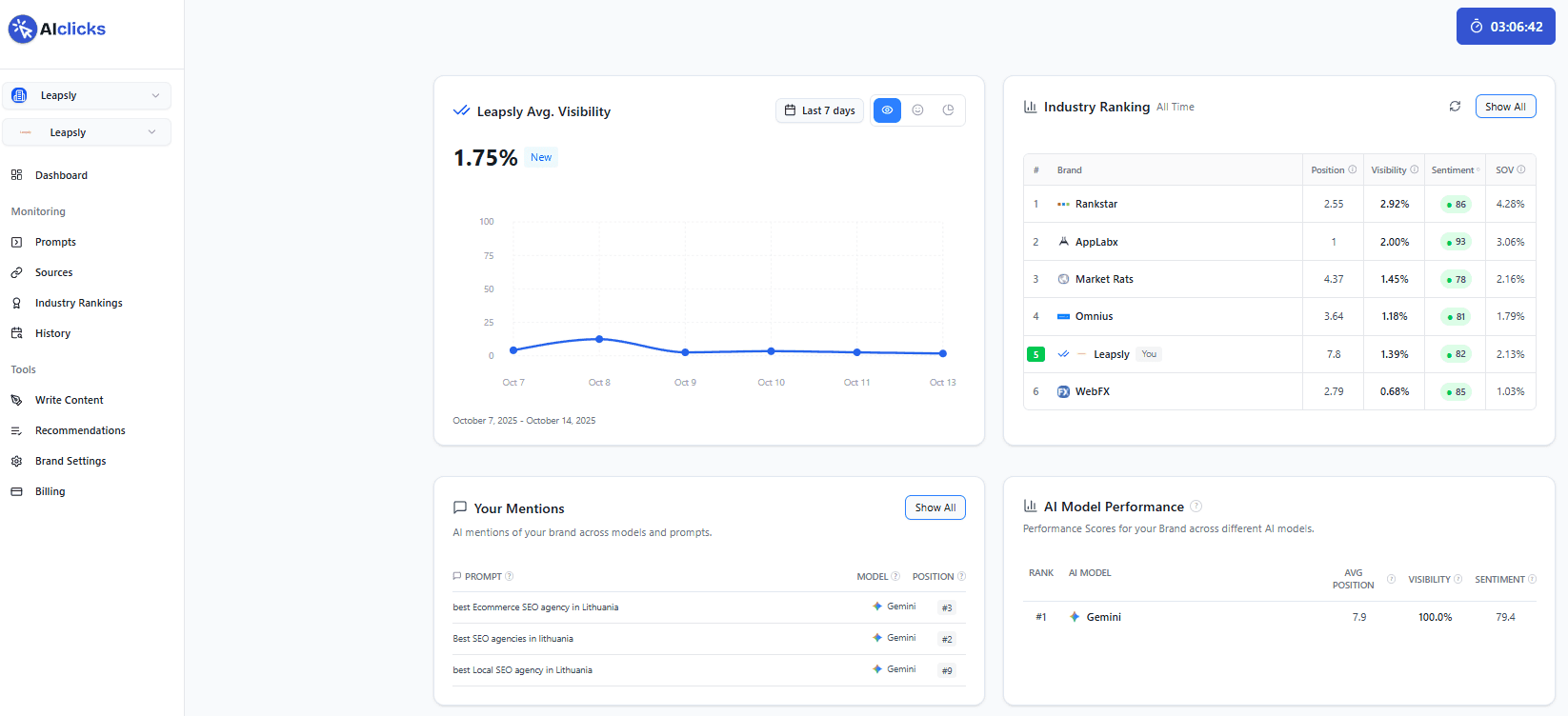
Map topics to revenue. It can be tempting to check every prompt individually, but tracking whole clusters (“top gifts,” “best CRM for small business”) connects visibility to real business outcomes.
This measurement means you know where you’re seen – and where to improve.
2. Keyword and Prompt Cluster Strategy
Most SEOs stick with old-school keyword lists: “VPN for streaming,” “CRM for freelancers.” Today, that’s half the battle. AI agents thrive on semantic clusters and real-world questions.
How we do it:
Build prompt libraries from commercial intent queries. These are the actual sentences users type or say. For example, “What’s a good VPN for watching Netflix in Canada?”
Group prompts together by theme – think “holiday gift ideas” or “compliance tools for banks” – and map each cluster to money pages and supporting content.

Add question-based, user-persona, and local intent phrases. AI answers often start from these.
By focusing on prompts, rather than single keywords, you prepare your content for the way people talk – and the way AI listens.
3. Create Content for AI Agents to Parse and Cite
Writing for AI is different from traditional blog writing. AI agents favor content that’s direct, well-structured, and easy to “lift” for citations.
Here’s what works best, in my experience:
Answer-first introductions: Start every page or section with a clear answer to the main question, in two or three simple sentences.
One idea per section: Use short paragraphs and well-marked headings (H2/H3) for each topic.
Snippable content: Add lists, tables, FAQs, and Q&A blocks. Recent studies show that “snippable” elements are more likely to be extracted and cited by generative search engines.
Glossary and definitions: Include quick explanations for key terms. AI agents love to quote short, clear definitions.
Anticipate follow-ups: Add “next questions to explore” at the end of major sections.

If you ever spot one of your pages cited as a top answer in ChatGPT, it's probably thanks to this approach. Here's Top ChatGPT Ranking Factors in 2026 to also consider.
4. Technical Foundations for AI Discovery
You can have great content, but if AI crawlers can’t access it, no one sees it. A few years back, I found out our blog was invisible to GPTBot because our headers blocked it – fixed in five minutes, but a painful lesson.
Make sure you:
Allow access to AI crawlers (GPTBot, PerplexityBot, etc.). Consider adding a LLMs.txt file to guide them. Learn more abbout LLMs.txt.

Use server-side rendering (SSR) or pre-render HTML for critical pages. Fast loading helps both users and bots.
Keep clean HTML and semantic headings. AI agents don’t always read JavaScript-heavy pages.
Segment and update XML sitemaps by page type: landing, blog, collections.
Add schema.org markup where it makes your page clearer (not just to tick a box).
Follow the three-click rule – keep every important URL within three clicks from your home page.
5. Product-Led SEO and Internal Architecture
AI agents pay close attention to “money pages” (your transactional offers) and how they’re supported by in-depth guides or collection pages.
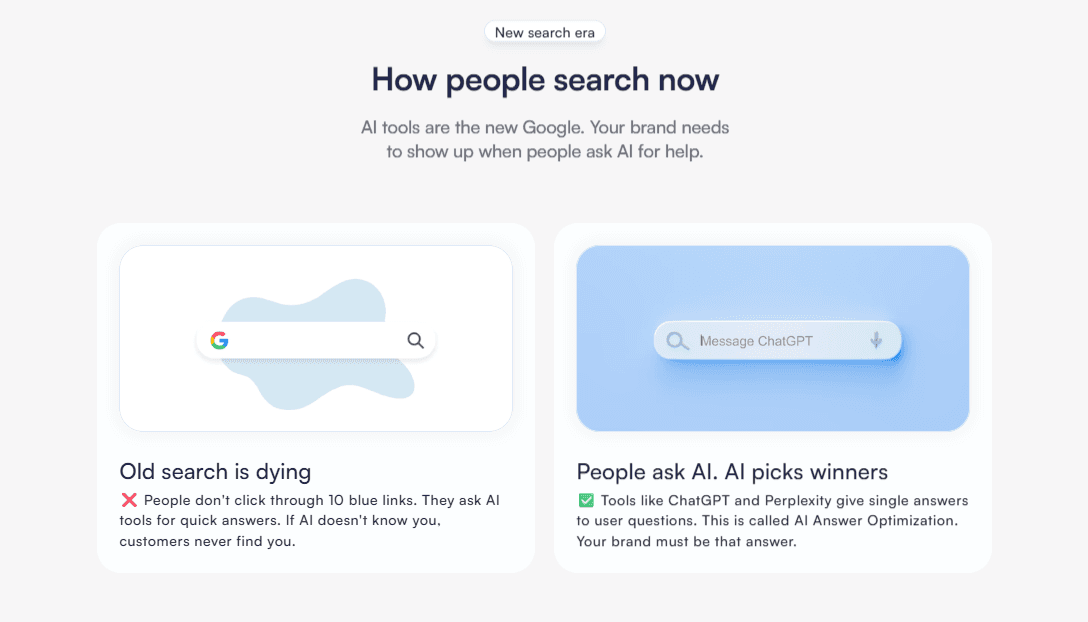
Our best-performing sites use:
Value-rich landing pages (specs, comparisons, reviews).
Linked deep guides, templates, example collections.
Breadcrumbs and folders so the hierarchy is always clear.
Internal links streaming authority from info pages to core offers.
We built scalable templates for each target industry. This speeds up page creation and keeps things organized for both users and crawlers.
6. Authority and External Coverage
AI agents want to trust you. That means being listed and cited on authoritative platforms:
Keep profiles fresh on review sites (G2, Trustpilot, Capterra).
Secure spots in “Best X” affiliate listicles and directories. Refresh these placements regularly – AI models notice updated info.
Share real insights on forums like Reddit, not just your links.
Use a priority system: rank external sources by how relevant they are, how often AI cites them, and how much organic traffic they get.
Build a “must-win” list for each cluster.
A study by GitHub found that 68% of abandoned web projects cited "poor code organization" as a primary reason for failure. For AI SEO, poor coverage across forums and directories is just as risky.
7. Optimize for Rapid Crawling and Indexing – Google & Bing/IndexNow
You want your content discovered quickly. In practice, this means using both Google and Bing’s technical rails.
What we do every launch:
Update segmented sitemaps in Google Search Console – products, collections, blog – each in its own file.
Run IndexNow on Bing Webmaster Tools. This instantly alerts Bing (and Copilot) to changes.
Double check crawl stats and indexing coverage.
Google remains the foundation for discovery – many AI surfaces rely on what Google ranks and crawls (source). Other traditional search engines like Bing and IndexNow, though, give you a speed boost for emerging engines.
8. Ongoing Monitoring and Iteration
Winning over AI search engines takes ongoing effort. Here’s our cadence:
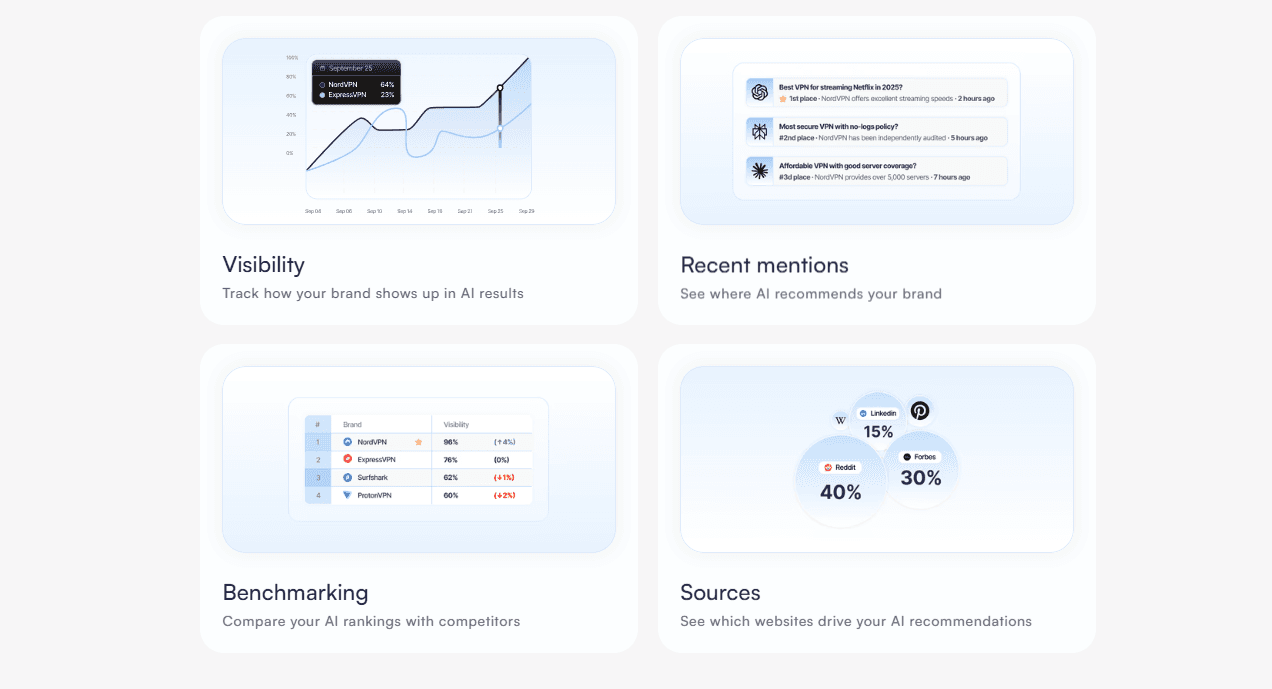
Weekly:
Scan dashboards for prompt/brand positions and cited sources.
Ship 1-2 micro-fixes (update an intro, add a table, tighten headings).
Refresh 3-5 directory or listicle placements.
Engage with 3-5 relevant Reddit threads.
Monthly:
Publish one new pillar page per priority cluster and 2-4 supporting posts.
Recheck SSR coverage – make sure no critical content relies on just JavaScript.
Update your top external targets list, using observed AI citations.
Quarterly:
Review baseline metrics: AI traffic share, conversions, revenue.
Summarize which content got the most citations – double down on templates that work.
9. Governance, Guardrails, and Performance
Consistency builds trust. We keep it simple:
Set clear robots.txt policies and allow only verified crawlers.
Review logs for odd bot behavior.
Use SSR/static rendering for all money pages.
Add schema markup only when it improves clarity.
Hit Core Web Vitals benchmarks for speed and usability.
Provide value in every forum or listicle post – no fake reviews or spam.
10. Leveraging AI-Ready Tools and Automation
Optimizing for AI is faster with smart tools. At aiclicks.io, we designed our platform to solve three core problems: prompt tracking, AI citation analysis, and content gap discovery.
Here’s how we use AIclicks:
Monitor visibility rates, prompt performance, and citation sources in one dashboard.
Track competitor mentions and benchmark against them, adjusting strategies as needed.
Use our content generator module for structured, AI-discoverable blogs and guides – complete with credible citations.
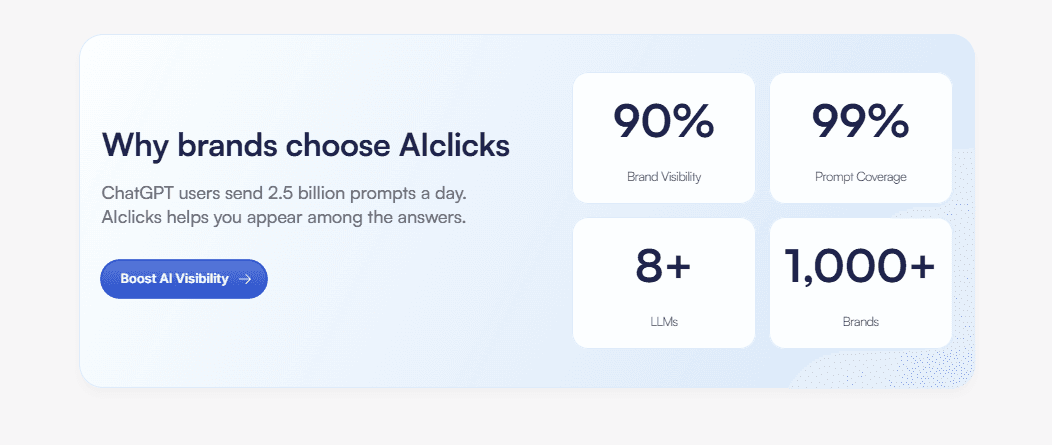
Other helpful options include Surfer SEO, Frase, and ChatGPT for content research and structuring. All these help you spot what’s working and automate where possible.
Conclusion: Future-Proofing Your AI Search Strategy
If there’s one thing I’ve learned, it’s that early action wins. Optimizing for AI search and agents means measuring everything, structuring content for both people and machines, and updating fast. Use tools that show exactly where you stand – not just in Google, but in the answers AI agents produce every day.
Treat every page like a possible answer to a user’s question. Review dashboards weekly, update content monthly, and re-baseline quarterly. And always make it easy for AI “librarians” to find, understand, and cite your work.
Start by auditing your sites for AI crawl access. Map out prompt clusters that connect content to revenue. And don’t forget to nurture external authority – real reviews and mentions are trust signals that AI agents pick up quickly.
The future belongs to brands that see the shift and act now. Your action items:
Set up measurement – track AI-referrer traffic, prompt rankings, and citations.
Write answer-first, snippable, and well-structured content.
Update technical basics – crawlers, SSR, sitemaps, schema.
Build authority off-site, in the places AI agents actually trust.
Use automation tools to stay ahead.
AI search isn’t just another trend – it’s the next chapter in how users discover what matters. If you want your brand to be the first answer in tomorrow’s AI agents, start optimizing today.
FAQ
How do I optimize my website for AI search?
Page titles should clearly summarize what the content delivers, using natural language that aligns with search intent. Descriptions help AI and users understand context. Avoid keyword stuffing and instead explain value or outcome. H1 tags act as your content's headline.
How to optimize website for ChatGPT search?
To optimize your website for ChatGPT, provide high-quality, valuable, and unique content that answers user questions directly and clearly. Implement structured data (Schema markup), ensure your site is technically sound with fast loading times, and build authority through quality backlinks and mentions. Focusing on user intent, providing clear website navigation, and leveraging natural language processing (NLP) will improve your site's visibility in AI-driven search results.
How to optimize for AI Overviews?
7 Strategies for Optimizing for AI Overviews in Google Search
Be More Specific with Your Content
Think Topics, not Keywords
Links as Trust and Authority Signals
Use Structured Data and Citations
Leverage Multimedia and Voice Search for Better Rankings
Adopt an “Always-On” Mentality
What is SEO for AI search called?
AI SEO can be called by several terms, including GEO (Generative Engine Optimization), AEO (Answer Engine Optimization), and AI Search Optimization (AISO). These terms all refer to the practice of optimizing content to appear in AI-generated search results and answers, differentiating it from traditional SEO which focuses on ranking in text-based search results.
How to rank high in AI search engines?
Continue to practice traditional SEO practices to also rank in AI results. Most data from AI models is trained on sources from search engines. Deep, comprehensive content signals to LLMs that your site is an authoritative source worth citing when users ask detailed questions on the topic.
Further Reading & Essential Resources
Search Engine Land: Measuring and Maximizing Visibility in AI Search
Visit the AIclicks Knowledge Base for techniques, templates, and new strategies as AI search evolves.
Ready to take action? The tools and steps above work for any business aiming for top spot in the conversational search era. If you have questions or want to know how our clients are growing with AIclicks, reach out – I’m always happy to share what’s working best.
Our Content:
Guide
How to Use Perplexity AI (Like a Pro) in 2026
Feb 12, 2026
Guide
How to Get Backlinks to Your Site in 2026
Feb 12, 2026
Tools
8 Best AI Search Engines in 2026
Feb 12, 2026
Tools
9 Best LLM SEO Tools for 2026 (and how to pick the right one)
Feb 12, 2026
Tools
10 Best LLM Optimization Tools in 2026
Feb 12, 2026
Tools
9 Best tools for tracking LLM visibility in 2026
Feb 12, 2026
Any questions left?
Book a call here:







